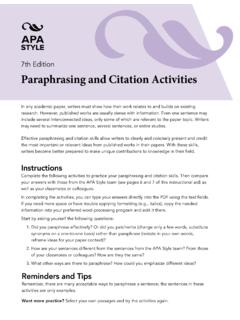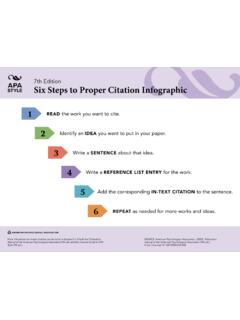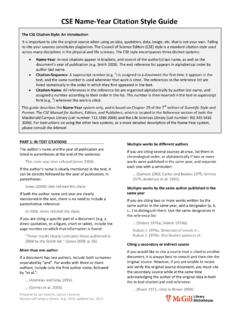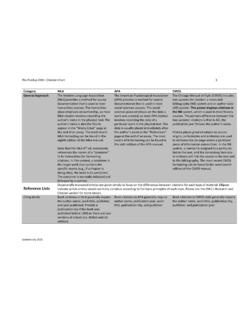Transcription of American Society of Microbiology (ASM) Citation Style
1 Introduction ASM uses a Citation -sequence system. List your sources on a works cited page in the order in which you refer to them in your paper, and number them sequentially. Cite each source by indicating its number in parentheses in your text. For example, the first source you mention or quote should be cited in the text of your paper with the nu-meral 1 in parentheses. (Note: If the Citation comes at the end of a sentence, the period should follow the parenthe-ses that enclose the Citation number.) The full Citation for that source should appear as number one in a list of refer-ences at the end of your paper. The following types of sources must be cited in your text and included in your list of references: journal articles (print, online, and in press*) books and book chapters (print, online, and in press*) patents theses and dissertations published conference proceedings meeting abstracts from published abstract books or journal supplements letters to the editor company publications *A reference to an in-press ASM publication should state the control number ( , JCM00577-13) if it is a journal article, or the name of the publication if it is a book.
2 If you use EndNote, you can download ASM Citation Style from Examples The following are examples of references to various types of sources. Note that material included in brackets ({}) is not part of the reference; it is additional information about the specific reference type. References to material published online must provide essentially the same information contained in references to printed material. For online journal articles, posting or revision dates may replace the year of publication; a DOI (preferred) or URL is required for articles with nontraditional page numbers or electronic article identifiers. Note on authors: ASM does not permit the use of the abbreviation et al. for second and subsequent authors; refer-ences must include the names of all authors, no matter how many.
3 Note on journal titles: In references to material published in journals, the journal title must be abbreviated accord-ing to standard practice. Appropriate journal title abbreviations can be found in the PubMed Journal Database (URL: ). Print Journal Article 1. Caserta E, Haemig HAH, Manias DA, Tomsic J, Grundy FJ, Henkin TM, Dunny GM. 2012. In vivo and in vitro analyses of regulation of the pheromone-responsive prgQ promoter by the PrgX pheromone receptor protein. J. Bacteriol. 194:3386-3394. Online Journal Articles American Society of Microbiology (ASM) Citation Style 2. Winnick S, Lucas DO, Hartman AL, Toll D. 2005. How do you improve compliance? Pediatrics 115:e718-e724. 3. Smith FX, Merianos HJ, Brunger AT, Engelman DM. 2001. Polar residues drive association of polyleucine transmembrane helices.
4 Proc. Natl. Acad. Sci. U. S. A. 98:2250-2255. 4. Dionne MS, Schneider DS. 2002. Screening the fruitfly immune system. Genome Biol. 3:REVIEWS1010. Article in Print Book 5. Forman MS, Valsamakis A. 2011. Specimen collection, transport, and processing: virology, p 1276-1288. In Versalovic J, Carroll KC, Jorgensen JH, Funke G, Landry ML, Warnock DW(ed), Manual of clinical microbi-ology, 10th ed, vol 2. ASM Press, Washington, DC. Article in Press 6. Cox CS, Brown BR, Smith JC. J. Gen. Genet., in press.* {Article title is optional; journal title is mandato-ry.} Print Book 7. da Costa MS, Nobre MF, Rainey FA. 2001. Genus I. Thermus Brock and Freeze 1969, 295,AL, emend. Nobre, Tr per and da Costa 1996b, 605, p. 404-414. In Boone DR, Castenholz RW, Garrity GM (ed), Bergey's manual of systematic bacteriology, 2nd ed, vol 1.
5 Springer, New York, NY. Online Book 8. Gregory ST. 2 September 2009, posting date. Chapter , Structural basis for the decoding mechanism. In B ck A, et al (ed), EcoSal Escherichia coli and Salmonella: cellular and molecular biology. ASM Press, Washington, DC. {Note that each chapter has its own posting date.} Book in Press 9. Fitzgerald G, Shaw D. In Waters AE (ed), Clinical Microbiology , in press. EFH Publishing Co., Boston, MA.* {Chapter title is optional.} Conference Proceedings 10. Green PN, Hood D, Dow CS. 1984. Taxonomic status of some methylotrophic bacteria, p 251-254. In Craw-ford RL, Hanson RS (ed), Microbial growth on C1 compounds. Proceedings of the 4th International Symposi-um. American Society for Microbiology , Washington, DC. Company Publication 11. Stratagene. 2006.
6 Yeast DNA isolation system: instruction manual. Stratagene, La Jolla, CA. {Use the com-pany name as the author if none is provided for a company publication.} Meeting Abstract Publish in Journal Supplement 12. Garc a CO, Paira S, Burgos R, Molina J, Molina JF, Calvo C, Vega L, Jara LJ, Garc a-Kutzbach A, Cuellar ML, Espinoza LR. 1996. Detection of Salmonella DNA in synovial membrane and synovial fluid from Latin American patients using the polymerase chain reaction. Arthritis Rheum. 39(Suppl 9):S185. Abstracts from Abstract Books 13. Smith D, Johnson C, Maier M, Maurer JJ. 2005. Distribution of fimbrial, phage and plasmid associated virulence genes among poultry Salmonella enterica serovars, abstr P-038, p 445. Abstr. 105th Gen. Meet. Am. Soc. Microbiol. American Society for Microbiology , Washington, DC.
7 {Abstract title is optional.} 14. Rotimi VO, Salako NO, Mohaddas EM, Philip LP. 2005. Abstr. 45th Intersci. Conf. Antimicrob. Agents Chemother., abstr D-1658. {Abstract title is optional.} Dissertation 15. O'Malley DR. 1998. thesis. University of California, Los Angeles, CA. {Title is optional.} Patent 16. Odell JC. April 1970. Process for batch culturing. US patent 484,363,770. {Include the name of the patented item/process if possible; the patent number is mandatory.} Letter to the Editor 17. Falagas ME, Kasiakou SK. 2006. Use of international units when dosing colistin will help decrease confu-sion related to various formulations of the drug around the world. Antimicrob. Agents Chemother. 50:2274-2275. (Letter.) {"Letter" or "Letter to the editor" is allowed but not required at the end of such an entry.}
8 }






